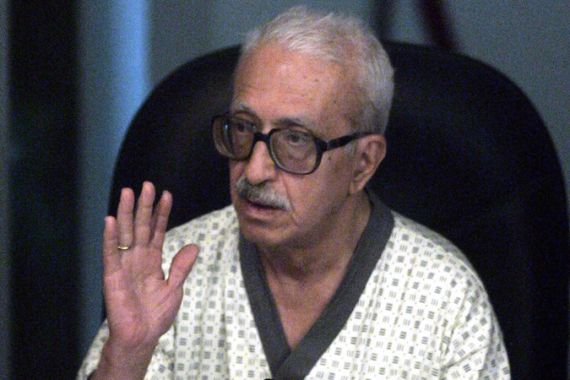Talabani against Aziz execution
Iraqi president says he will not sign execution order for Tariq Aziz, the former foreign minister under Saddam Hussein.

 |
| Talabani told France 24 he sympathises with Aziz because he is an Iraqi Christian and an old man who is over 70 [AFP] |
Jalal Talabani, the Iraqi president, has said he will not sign an execution order for Tariq Aziz, the former deputy of Saddam Hussein sentenced to death last month over the persecution of Islamic parties.
“No, I will not sign the execution order for Tariq Aziz, because I am a socialist,” Talabani told French television France 24 in an interview on Wednesday.
“I sympathise with Tariq Aziz because he is an Iraqi Christian. Moreover he is an old man who is over 70,” he said.
Iraq’s high tribunal passed a death sentence on Aziz, who had previously been convicted for his role in the execution of dozens of merchants for profiteering.
“The court […] issued the death sentence on Tariq Aziz and four others for committing crimes against humanity. The charge of elimination of religious parties was classified as crimes against humanity,” Judge Mohammed Abdul-Sahib, a spokesman of the Iraqi High Tribunal, said in October.
“The nature of the crimes is willful killing, torture and the enforced disappearance of persons.”
The charges against Aziz are related to the persecution of Shia Muslim parties in the 1980s.
Aziz, 74, was at the centre of explaining Iraq’s policy in the months leading up to the first Gulf War after Iraq’s invasion of Kuwait, and in the years after as Iraq faced sanctions and arms inspections.
The Vatican and Russia have both called on Iraq not to carry out the death sentence on humanitarian grounds, noting his age and the fact he has health problems.
‘Invalid sentence’
Shortly after the verdict was announced Badee Aref, Aziz’s lawyer, told Al Jazeera that from a legal perspective the sentence was “unreasonable, irrational and wrong”.
“I don’t recognise this court because it sentenced Saddam Hussein to death and all the decisions it took are void because they are based on murder and assassination,” Aref said.
“It is an invalid sentence from both legal and ethical perspectives.”
Aref said that the timing of the sentence was aimed at diverting attention away from crimes that happened in Iraq that were outlined by WikiLeaks in October.